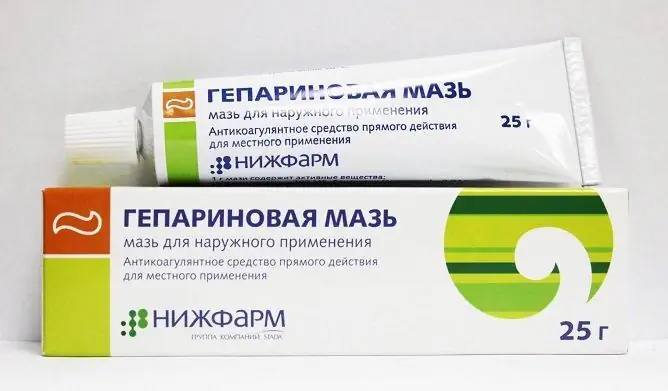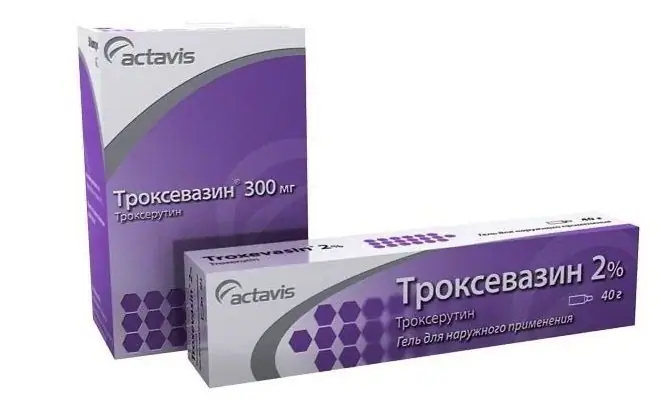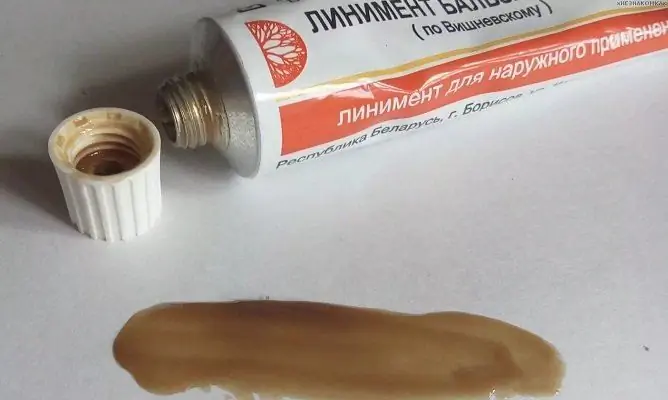- Author Rachel Wainwright wainwright@abchealthonline.com.
- Public 2023-12-15 07:39.
- Last modified 2025-11-02 20:14.
Microiodide 200
Mikroyodid 200: instructions for use and reviews
- 1. Release form and composition
- 2. Pharmacological properties
- 3. Indications for use
- 4. Contraindications
- 5. Method of application and dosage
- 6. Side effects
- 7. Overdose
- 8. Special instructions
- 9. Application during pregnancy and lactation
- 10. Use in childhood
- 11. In case of impaired renal function
- 12. Drug interactions
- 13. Analogs
- 14. Terms and conditions of storage
- 15. Terms of dispensing from pharmacies
- 16. Reviews
- 17. Price in pharmacies
Latin name: Microiodide 200
ATX code: H03CA
Active ingredient: potassium iodide (Potassium iodide)
Manufacturer: JSC "Tatkhimfarmpreparaty" (Russia)
Description and photo update: 2019-08-07

Microiodide 200 is a drug for the prevention and treatment of iodine deficiency conditions.
Release form and composition
The drug is available in the form of tablets: white, flat-cylindrical, round, with a dividing line and a chamfer (in blisters: 10 pcs., 5 packs in a cardboard box; 25 pcs., In a cardboard box 2, 4, 6 or 8 packs; each pack also contains instructions for the use of Microiodide 200).
1 tablet contains:
- active substance: potassium iodide - 0.262 mg, which is equivalent to 0.2 mg of iodide;
- auxiliary components: sucrose, lactose monohydrate, aerosil (colloidal silicon dioxide), calcium stearate.
Pharmacological properties
Pharmacodynamics
Microiodide 200 is an iodine preparation that regulates the synthesis of thyroxine, the thyroid hormone of the thyroid gland. The active ingredient of the drug is potassium iodide, in addition to replenishing the iodine deficiency, it has an antithyroid, expectorant, mucolytic, radioprotective, resorbable, antifungal effect.
Iodine is an essential trace mineral that the thyroid gland needs to function properly. After iodide enters the epithelial cells of the thyroid follicle, iodine ions are oxidized under the influence of the enzyme iodide peroxidase to elemental iodine. The resulting iodine is incorporated into the tyrosine molecule, where one part of the tyrosine radicals is iodized in thyroglobulin to form thyronines, among which the main ones are triiodothyronine (T3) and thyroxine (T4). Thyronines with thyroglobulin form a complex that is deposited in the colloid of the thyroid follicle.
The intake of iodine in the body in a physiological amount helps to prevent the development of endemic goiter caused by iodine deficiency in food. Taking the drug affects the indicators of the ratio of T3 and T4, the level of thyroid-stimulating hormone, in children (including newborns) - it normalizes the size of the thyroid gland.
Pharmacokinetics
After taking Mikroyodide 200 inside, there is a rapid and complete absorption of potassium iodide in the small intestine. Its distribution in the intracellular space lasts for 2 hours.
The concentration of iodide in the tissues of the thyroid gland is more than 0.5 mg / g, in addition, it accumulates in the mucous membrane of the stomach, salivary and mammary glands.
Actively overcomes the hematoplacental barrier, excreted in breast milk.
It is excreted mainly through the kidneys: 80% of the dose - within the first 48 hours, the rest - within 10-20 days. Partially potassium iodide is excreted with the secretions of salivary, sweat, bronchial and other glands.
Indications for use
- treatment of diffuse euthyroid goiter in young adult patients and children, including newborns;
- prevention of recurrence of goiter after surgery to remove it or a course of goiter therapy with thyroid hormones;
- prevention of the development of endemic goiter, including during pregnancy.
Contraindications
Absolute:
- hypothyroidism (except when the cause of its occurrence is a pronounced iodine deficiency);
- severe thyrotoxicosis;
- latent thyrotoxicosis - for the use of the drug in a daily dose above 0.15 mg;
- dermatitis herpetiformis;
- toxic adenoma, nodular goiter - for the use of the drug in a daily dose above 0.3 mg, except for preoperative therapy for the purpose of blocking the thyroid gland;
- simultaneous treatment with radioactive iodine in patients with or suspected thyroid cancer;
- galactose intolerance, lactase deficiency, glucose-galactose malabsorption syndrome;
- hypersensitivity to iodine and drug components.
Microiodide 200 should be used with caution in case of impaired renal function.
Microiodide 200, instructions for use: method and dosage
The tablets are taken orally, after meals, with plenty of liquid.
When treating children under the age of three years, the tablet must be dissolved in 1 tablespoon of cooled boiled water.
The dose and duration of taking Mikroyodide 200 is determined by the attending physician.
The daily dose is taken once.
Recommended daily dosage:
- prevention of the development of endemic goiter: children, including newborns, - 0.1 mg; adolescents and adults - 0.1-0.2 mg; during pregnancy and lactation - 0.15-0.2 mg;
- prevention of recurrence of goiter after completion of the course of treatment with hormonal preparations of the thyroid gland or after surgery to remove it: 0.1-0.2 mg;
- treatment of euthyroid goiter: newborns, children, adolescents - 0.1-0.2 mg; young patients and adults - 0.3-0.5 mg.
The period of application of Mikroyodide 200 for the purpose of prophylaxis can last several months or even years, if indicated, for life. The course of treatment for goiter in newborns is on average 0.5-1 months, in children, adolescents and adults - 6-12 months or more.
Side effects
Against the background of the use of Mikroyodide 200 in the recommended doses, the development of undesirable effects is unlikely.
In rare cases, allergic reactions may occur in the form of a skin rash, Quincke's edema.
Overdose
Symptoms: against the background of long-term therapy in a daily dose above 0.3 mg, iodine-induced hyperthyroidism may develop, more often in elderly patients suffering from goiter for a long time, as well as with nodular goiter or toxic adenoma. With chronic overdose, the development of iodism (excess iodine in the body) is possible. The characteristic symptoms of iodism are: metallic taste in the mouth, acne, inflammation and swelling of the mucous membranes (conjunctivitis, rhinitis, gastroenteritis, bronchitis), swelling of the salivary glands, dermatitis, nervous irritability, fever. Symptoms of acute overdose include reflex vomiting, brown staining of mucous membranes, abdominal pain, diarrhea (including melena), in severe cases, dehydration and shock are possible.
Treatment: in case of chronic overdose, discontinuation of Mikroyodide 200 is required. Therapy of acute overdose includes immediate gastric lavage, administration of sodium thiosulfate, then the appointment of symptomatic therapy, measures to restore water and electrolyte balance, anti-shock therapy.
special instructions
Before starting the use of potassium iodide, it is necessary to conduct an appropriate examination in order to exclude a malignant lesion of the thyroid gland, hyperthyroidism or nodular toxic goiter.
In case of impaired renal function, taking Mikroyodide 200 increases the risk of developing hyperkalemia, therefore, treatment in this category of patients must be accompanied by periodic monitoring of the level of potassium in the blood.
It should be borne in mind that against the background of the use of the drug in doses exceeding 0.15 mg per day, the transition of the latent form of hyperthyroidism to the manifest form is possible.
Influence on the ability to drive vehicles and complex mechanisms
During the period of taking Mikroyodide 200, the ability of patients to drive vehicles and mechanisms is not impaired.
Application during pregnancy and lactation
During the period of gestation and breastfeeding, the need for iodine increases. Indications for the appointment of Mikroyodide 200 during pregnancy and lactation are cases when the intake of iodine with food consumed per day is less than 0.2 mg.
It should be borne in mind that if the recommended doses are exceeded, the drug can cause the development of hypothyroidism and goiter in the fetus.
Pediatric use
The use of Mikroyodide 200 in children, including newborns, is indicated for clinical indications within the recommended dosage range.
With impaired renal function
Microiodide 200 should be used with caution in patients with renal impairment.
Drug interactions
During the period of application of Mikroyodide 200, it should be borne in mind that potassium thiocyanate and perchlorate inhibit the absorption of iodine by the thyroid gland. Thyroid stimulating hormone improves the absorption of iodine by the thyroid gland, stimulates the production of its hormones.
With concomitant therapy with antithyroid drugs, there is a mutual weakening of the effects.
The risk of hyperkalemia increases with the simultaneous use of the drug with angiotensin-converting enzyme inhibitors (including lisinopril, captopril, enalapril), with a combination of high doses of iodine and potassium-sparing diuretics.
Taking lithium preparations in combination with high doses of iodine contributes to the occurrence of goiter and hypothyroidism.
Against the background of potassium iodide, the uptake of the iodine isotopes 1311 and 1231 by the thyroid gland decreases.
Analogs
Analogs of Mikroyodide 200 are: Mikroyodide 100, Potassium iodide, Iodomarin 100, Iodomarin 200, 9 months Potassium iodide, Iodine Vitrum, Iodine Vitrum for children, Iodbalance, Potassium iodide Reneval.
Terms and conditions of storage
Keep out of the reach of children.
Store at temperatures up to 25 ° C, protected from moisture and light.
The shelf life is 3 years.
Terms of dispensing from pharmacies
Available without a prescription.
Reviews of Mikroyodid 200
Reviews of Mikroyodid 200 are few, but they are positive. Patients report that the regular use of Mikroyodide 200, including during pregnancy, helps to prevent iodine deficiency and increase the tone of the body, especially in the autumn-winter period.
Price for Microiodide 200 in pharmacies
The price of Microiodide 200 for a package containing 50 tablets can be from 54 rubles, 100 tablets - from 121 rubles.

Maria Kulkes Medical journalist About the author
Education: First Moscow State Medical University named after I. M. Sechenov, specialty "General Medicine".
Information about the drug is generalized, provided for informational purposes only and does not replace the official instructions. Self-medication is hazardous to health!






